


An aerial photo of the aftermath of the devastating earthquake in Jindires town in the border Afrin region in the northern countryside of Aleppo - February 7, 2023 (Syria Civil Defense/Facebook)


Hussam al-Mahmoud | Jana al-Issa | Lujain Mourad
“About an hour away from Antakya, we bury them in the Yayladağ region, close to the Syrian region of Kessab. If we return to Syria one day, we can come and visit them.”
This is how Ahmad Haj Bakri summed up the plight of a family, many of whose members are still under the rubble in the city of Antakya, five days after the catastrophe of the devastating earthquake that struck the southern Turkish state of Kahramanmaraş with severe repercussions on ten Turkish states and four Syrian governorates and more than 36,000 people have been killed.
Haj Bakri, a journalist from coastal Latakia countryside, shares with four members of his family the task of searching for 30 to 40 relatives who were hidden by the rubble. He told Enab Baladi that they had agreed to collect the bodies of the relatives they pulled out at night to bury them during the day.
In the rhythm of the same tragedy, time has passed since the dawn of last Monday for thousands of families in Syria and Turkey, who rolled up their sleeves to search for their loved ones due to the inadequacy of the rescue teams coming from all over the world to Turkey or left without support in northwestern Syria.
The reasons that hindered the arrival of aid to Syria and the effects of the delay that is not forgiven by the statements that came from more than one official and an international body to justify it. All of this is explored by Enab Baladi in this file.
It also sheds light on the magnitude of the needs imposed by the disaster, which opened the door to additional needs and necessities in a vulnerable region in terms of the level of services available there.
In the early hours of Monday morning, a 7.7 magnitude earthquake hit the state of Kahramanmaraş, crossing the Turkish border into Syria, many of whose areas woke up to a wound that had not yet stopped bleeding to heal.
The first earthquake was followed by another earthquake in the same state, with a magnitude of 7.6 at noon on the same day.
The death toll from Monday’s quakes stood at more than 36,000 and was certain to rise as search teams locate more bodies in the rubble, with an indefinite death toll for Syrians in Turkey who lost their lives in this disaster.
In addition to the deaths in the northwest of the country, which exceeded 2167, and the regime-controlled areas amounted to 1414, the affected Turkish cities sent the bodies of about a thousand Syrians to return and be buried in Syria, along with others whose numbers were not counted and buried in Turkish cemeteries, in which the names of the buried were absent, reducing the human being to a number.
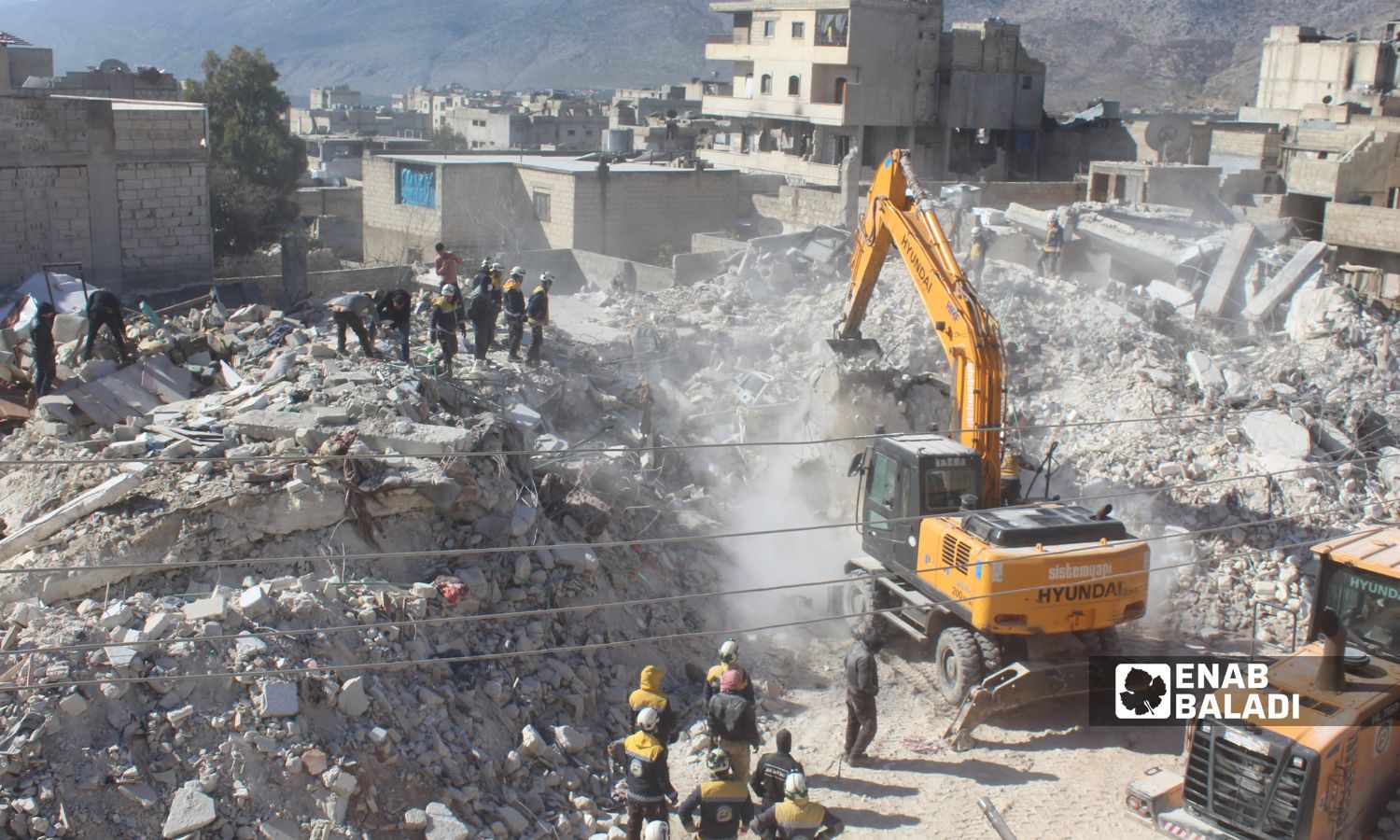
Volunteers of the Syria Civil Defense during the rescue operation among the rubble of collapsed buildings in the town of Armanaz in the western countryside of Idlib, following the earthquake that struck southern Turkey and northern Syria – February 9, 2023 (Enab Baladi/Iyad Abdul Jawad)
Half of the Syrian refugees in Turkey have settled in the quake-affected areas declared by the Turkish President, Recep Tayyip Erdogan, since the second day after the earthquake, with the alert being raised to the fourth level, which calls for international rescue intervention.
According to the latest statistics issued by the Turkish Presidency of Migration Management on February 2, the number of Syrian refugees in Turkey reached 3.5 million, almost half of whom are concentrated in Gaziantep, Hatay, Şanlıurfa, Adana, Kahramanmaraş (the epicenter), Kilis, Adiyaman, Osmaniye, Diyarbakir and Malatya.
Despite the Syria Civil Defense (SCD) declaring northwestern Syria a stricken area, the international and UN support for the first four days remained imprisoned by UN statements that cited logistical difficulties, the hopes of the rescue teams to find survivors in the area did not fade, and the Syrian north, which hosts displaced people from throughout Syria, moved to another chapter in dealing with the earthquake catastrophe.
Yasmine Morjan, who resides in Jindires with her son and grandchildren, recounted to Enab Baladi the events of the earthquake that she experienced in the town northwest of Aleppo, after which she survived on her own, without family members.
“The weather was cold and rainy, the house collapsed, and the family sank into the rubble, and only one of the relatives was left,” Morjan said.
Jindires is considered one of the most affected areas in northwestern Syria, in terms of human losses, with 515 deaths recorded and more than 830 injured, who were pulled out from under the rubble by the rescue civil defense teams.
On February 10, Raed al-Saleh, the head of the Syria Civil Defense (The White Helmets) emergency response group, announced in a press conference the transition from the search and rescue phase to the search and recovery phase, pointing to the decline in the chances of those trapped under the rubble to survive more than five days after the earthquake.
Al-Saleh said that the search and rescue teams were racing against time to rescue the victims stuck under the rubble, stressing that the lack of effective equipment was a major reason for the inability to rescue many people.
On the fifth day after the disaster, UN aid trucks began entering, and others from the Kurdistan region of Iraq, Kuwait, Saudi Arabia, and Qatar, and while they were devoid of the rescue equipment that the North demanded to support in rescuing the stranded, its entry was also linked to the features of a deal with the Syrian regime, which on the same day declared the governorates of Aleppo, Latakia, Hama, and Idlib, as disaster-stricken areas, which is the first time that it recognized the Idlib governorate, which is outside its control, as part of the response.
The numbers and statistics that are issued successively show the size and impact of the earthquake, whose repercussions did not stop, and the ceiling of its losses did not reach its maximum until the preparation of this file.
The Director of Risk Management and Reduction in the Turkish Disaster and Emergency Management (AFAD), Orhan Tatar, explained, on Saturday, that the energy released by the earthquake, which had a magnitude of 7.7 and was concentrated in the Pazarcık town in the southern part of Kahramanmaraş, is the energy of 500 atomic bombs.
Carlo Doglioni, president of Italy’s National Institute of Geophysics and Volcanology, said on February 7 that the earthquakes shifted Turkey three meters to the west. Another expert called Doglioni’s estimate ‘perfectly reasonable,’ adding that the earthquakes occurred at the meeting point of the eastern Anatolian plates with the Arabian and African plates.
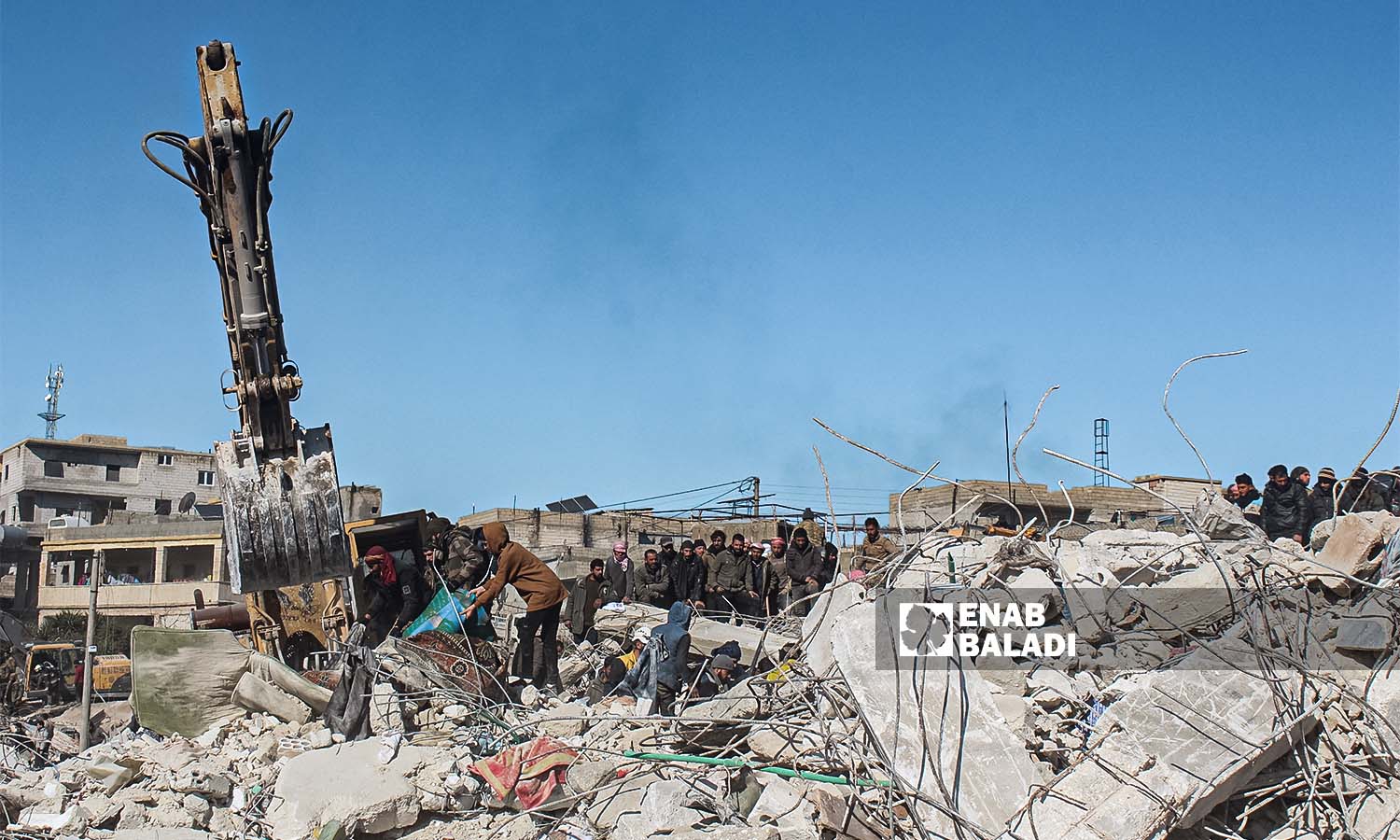
White Helmets workers and volunteer residents search for victims and survivors amid the rubble of collapsed buildings in Harem town – February 8, 2023 (Enab Baladi/Iyad Abdul Jawad)
The international community did not respond to the needs of the “stricken” region in northwestern Syria, and its response was limited to promises that were not implemented before the passage of four days, which were sufficient to diminish hopes of finding survivors stuck under the rubble.
The absence of response exacerbated the catastrophe, robbed the families of the missing of their hopes for the survival of their loved ones, and doubled the organizations’ inability to comprehend the horror of the need amid justifications and explanations that humanitarian workers considered a “contradiction of reality.”
Almost one week after the devastating earthquake struck northern Syria and neighboring Turkey, the UN has acknowledged an international failure to help Syrian quake victims.
UN Under-Secretary-General for Humanitarian Affairs and Emergency Relief Coordinator Martin Griffiths, visiting the Turkish-Syrian border Sunday, acknowledged in a statement that Syrians have been left “looking for international help that hasn’t arrived,” The AP reported.
“We have so far failed the people in northwest Syria. They rightly feel abandoned,” he said.
“My duty and our obligation is to correct this failure as fast as we can.”
The head of the White Helmets, Raed al-Saleh, said Griffiths’ visit was “too little, too late.” He said calls for international assistance by local rescue teams had gone unheeded for days, “and during this time, countless lives have been needlessly lost.”
Al-Saleh met with Griffiths to demand the opening of additional cross-border routes for aid to enter without waiting for authorization from the UN Security Council.
Since the occurrence of the earthquake, the eyes of the Syrians have been directed towards the United Nations, as it is responsible for delivering aid to northern Syria, the geographical area where political decisions govern the humanitarian aid arriving there.
After a full day of waiting and the loss of life, the United Nations justified its lack of response to the Syrians’ pleas, Madevi Sun-Suon, spokesperson for the UN Office for the Coordination of Humanitarian Assistance (OCHA), told Reuters that “The flow of critical UN aid from Turkey to northwest Syria has temporarily halted due to damage to roads and other logistical issues related to the deadly earthquake that struck the two countries on Monday.”
“Some roads are broken, some are inaccessible. There are logistical issues that need to be worked through,” Sun-Suon added.
Stéphane Dujarric, Spokesman for the Secretary-General of the United Nations, said on Tuesday briefing that the road leading to the Bab al-Hawa border crossing from Turkey to northern Syria was damaged, which temporarily disrupted the delivery of aid to the northwest, explaining that the crossing itself was not damaged, Reuters reported.
This was followed by the entry of a pre-scheduled aid convoy on the fourth day of the earthquake, then two earthquake response convoys on the fifth and sixth days, which sparked criticism and calls for those responsible for the late arrival of aid to be held accountable.
The aid provided was limited to relief and food materials, while the necessary equipment to rescue those trapped under the rubble was absent, which the Civil Defense has repeatedly warned of the impact of its shortage.
During the press conference in which the Civil Defense announced the end of rescue operations and the start of operations to recover the bodies, the director of the organization, Raed al-Saleh, called the United Nations’ response “catastrophic” and said the body should “apologize to the Syrian people for the lack of help it provided.”
For his part, Syrian doctor Mohammad Kattoub, a humanitarian activist and former aid and advocacy worker, said that the United Nations “failed the Syrians” and showed clear neglect of their needs during the disaster.
Kattoub told Enab Baladi that many indicators showed that it deliberately delayed the arrival of aid and contributed to transforming rescue operations into operations to recover bodies.
Farhan Aziz Haq, Deputy Spokesman of the UN Secretary-General, told Enab Baladi via email that the United Nations has worked to rapidly increase its assistance, including through cross-border aid operations, especially in light of the multiplication of humanitarian needs as a result of the earthquake.
Aziz Haq added that the delivery of aid was “temporarily” interrupted for three days due to the damage to the roads from the earthquakes, but it resumed on February 10, referring to the start of the entry of aid convoys loaded with food and medical supplies.
The United Nations is preparing to deliver cross-border aid at the present time, according to what Aziz Haq said, indicating that the delay in the arrival of UN aid was not limited to northern Syria, as the first aid arrived in the areas controlled by the regime on February 11.
However, Aziz Haq ignored the arrival of dozens of shipments of aid from countries “friendly to the regime” to those areas, through airports and open borders, despite many criticisms of the way it was distributed or monopolized and stolen by the authorities of the Syrian regime and organizations close to it, then it was sold on the sidewalks, according to photos and video recordings that circulated on social media.
Enab Baladi also inquired about the reasons for the delay in the arrival of aid to the regime-held areas, but it did not receive a UN response on this part.
For years, international organizations have been working to deliver cross-border aid from Turkey into northern Syria, passing through the Bab al-Hawa crossing, with a mandate from the Security Council, and they are responsible for implementing Council Resolution No. 2165.
Former aid and advocacy worker, Mohammad Kattoub, said that the United Nations was able, under its mandate, to deliver aid in various ways.
The authorization to deliver aid in emergency humanitarian cases enables it to use all crossings, even the closed ones (Bab al-Hawa, Bab al-Salama, or al-Rai), in addition to delivering aid via contact lines or using airdrops for aid.
While the Syrian regime did not request the activation of the International Emergency Response System (UNDAC), the United Nations representative residing in Syria was supposed to bear the responsibility for that, according to Kattoub.
In the event that the UN representative fails to request the activation of the mechanism, the Secretary-General is supposed to request its activation directly to save the Syrians and reduce the impact of the disaster, Kattoub added.
|
The International Emergency Response System (UNDAC) is a system designed to assist the United Nations and governments of countries affected by disasters, especially earthquakes, during the first phase of a sudden-onset emergency. The United Nations Disaster Assessment and Coordination Team helps in coordinating international relief received at the national level or at the site of an emergency. The system enables the United Nations to deploy response teams within 12 to 48 hours anywhere in the world, free of charge for the affected country. The system is activated at the request of the UN Resident Coordinator, Humanitarian Coordinator, or the affected government. |
A group of senior international lawyers, legal experts, and former judges of the International Criminal Court and the International Court of Justice issued a letter on February 10 explaining that the continued passage of cross-border aid into Syria is legal without Security Council authorization.
The letter indicated that the conflict in Syria is subject to the third common article of the Geneva Conventions of 1949, which Syria ratified, and this allows access negotiations between neutral humanitarian agencies and all parties, including non-governmental ones, without the permission of the central government in the case of non-international armed conflicts.
Waiting for the authorization of the UN Security Council in the Syrian case is “illegal,” as the International Court of Justice, the main legal organ of the United Nations, officially confirmed that “there can be no doubt that humanitarian assistance to those in need, regardless of their political affiliations or goals, is an illegal interference.”
The group of lawyers noted that refusing to allow cross-border aid is illegal, especially when it is arbitrary.
The continuous arbitrary refusal of cross-border aid by the Syrian regime can also be answered by discriminating between those in need of humanitarian aid on ethnic, political, or religious grounds that violate international law, according to the letter.
In their letter, the rights advocates add that NGOs can continue to provide cross-border assistance under the relevant rules of public international law.
Donor countries and UN agencies can provide indirect assistance to respond to the regime’s refusal, which claims cross-border aid is a “violation of Syria’s sovereignty.”
No aid arrived in Syria from donor countries until the fifth day of the disaster, in addition to the delay in the arrival of UN aid.
The role of donor countries in the first days after the earthquake occurred was limited to promises of response and announcing the amounts allocated for the response, although many of these countries are partners of the White Helmets organization, which appealed to secure the equipment and fuel needed for rescue operations.
Among the most prominent of these countries are the US and Britain, in addition to Germany, France, Qatar, and Canada.
Enab Baladi tried to inquire about the reasons for the delay from these donors, but it got general responses that ignored the main questions.
A spokesperson for the US State Department told Enab Baladi via email that his country is committed to providing humanitarian aid to Syria and has worked to support the partner of the US Agency for International Development (USAID), the White Helmets, to provide emergency response services to more than 4.5 million Syrians.
He added that his country will announce more measures in the next few days when the search and rescue operations are completed.
The US is also working “hard” with the Turks and its non-governmental organization partners to maintain cross-border aid access to the affected areas of Syria, in addition to its work to address the damage to the Bab al-Hawa border crossing, according to the spokesman.
In turn, the European Union answered Enab Baladi’s questions that it is cooperating closely with its partners in the humanitarian field to assess the level of damage and needs inside Syria in the aftermath of the earthquake.
The EU continues to consider all viable options to activate additional resources for distribution to all affected areas as soon as possible in response to the disaster inside Syria.
While Enab Baladi contacted the British Foreign Ministry to ask about the reasons for the delay in responding to the humanitarian disaster in Syria, it did not receive a response until this file was prepared.
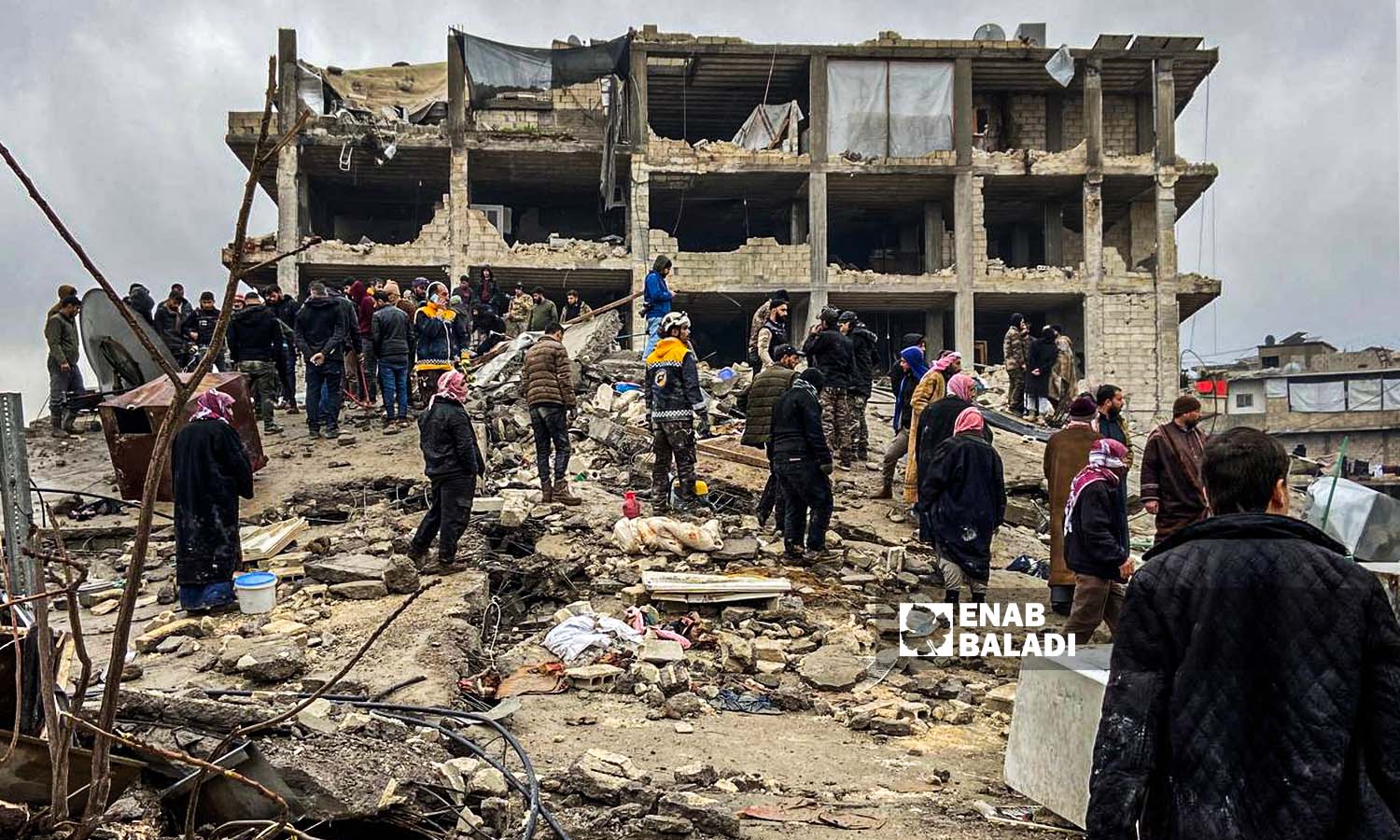
Syria Civil Defense workers and volunteer residents try to rescue and remove the victims who were trapped under the rubble in the Jindires area in the countryside of Afrin city, following an earthquake that struck northwestern Syria – February 6, 2023 (Enab Baladi/Amir Kharboutli)
On the fourth day of the earthquake, the Syrian regime and the United States took decisions after years of intransigence within what experts considered a “political deal with UN participation.” A day after these decisions, the UN took its first steps in response to the earthquake disaster.
In a decision that was not published on the digital accounts of the Central Bank of Syria (CBS) or the pro-regime media, and after years of intransigence, the Central Bank approved on February 9 to apply the exchange rate of the remittance and exchange bulletin, which is close to the black market exchange rate ($1 for 6900 SYP), on the transfers of UN, international and humanitarian organizations received for the purpose of emergency response to the earthquakes that struck Syria on Monday’s pre-dawn.
The regime’s Central Bank said, in a statement, that the external remittances transferred for the purposes of emergency response to the earthquake are excluded from the provisions of Resolution “145/LE.”
During the past years, UN and international bodies called on the regime to adjust this price in order to try to benefit more from the value of aid and reduce the regime’s looting of this aid, which it was practicing through the difference in the exchange rates it was imposing and the real price of the dollar against the Syrian pound, a concession that the regime had never made previously.
On the same day, the US Treasury issued a decision exempting Syria from sanctions imposed under the Caesar (sanctions) Act for a period of six months, including all transactions related to the earthquake response.
The 180-day license allows the processing or transfer of funds on behalf of people from other countries to or from Syria in support of authorized transactions, as well as allowing all earthquake relief-related transactions that were prohibited under Syrian sanctions regulations.
On the fifth day of the earthquake, the government of the Syrian regime declared the governorates of Idlib, Aleppo, Latakia, and Hama as disaster-stricken areas, without mentioning the reason for the delay, despite a prior statement by its officials that this could be announced at any time.
While a number of Syrian experts told Enab Baladi that the delay came until the regime achieved political gains, as declaring a disaster-stricken area is a political term related to the mechanism for requesting international relief aid, and it is subject to international standards that limit the powers of the official authorities in how to dispose of this aid, which the regime has tried to delay, so that aid organizations do not enter northwest Syria through its areas of influence without obtaining a return.
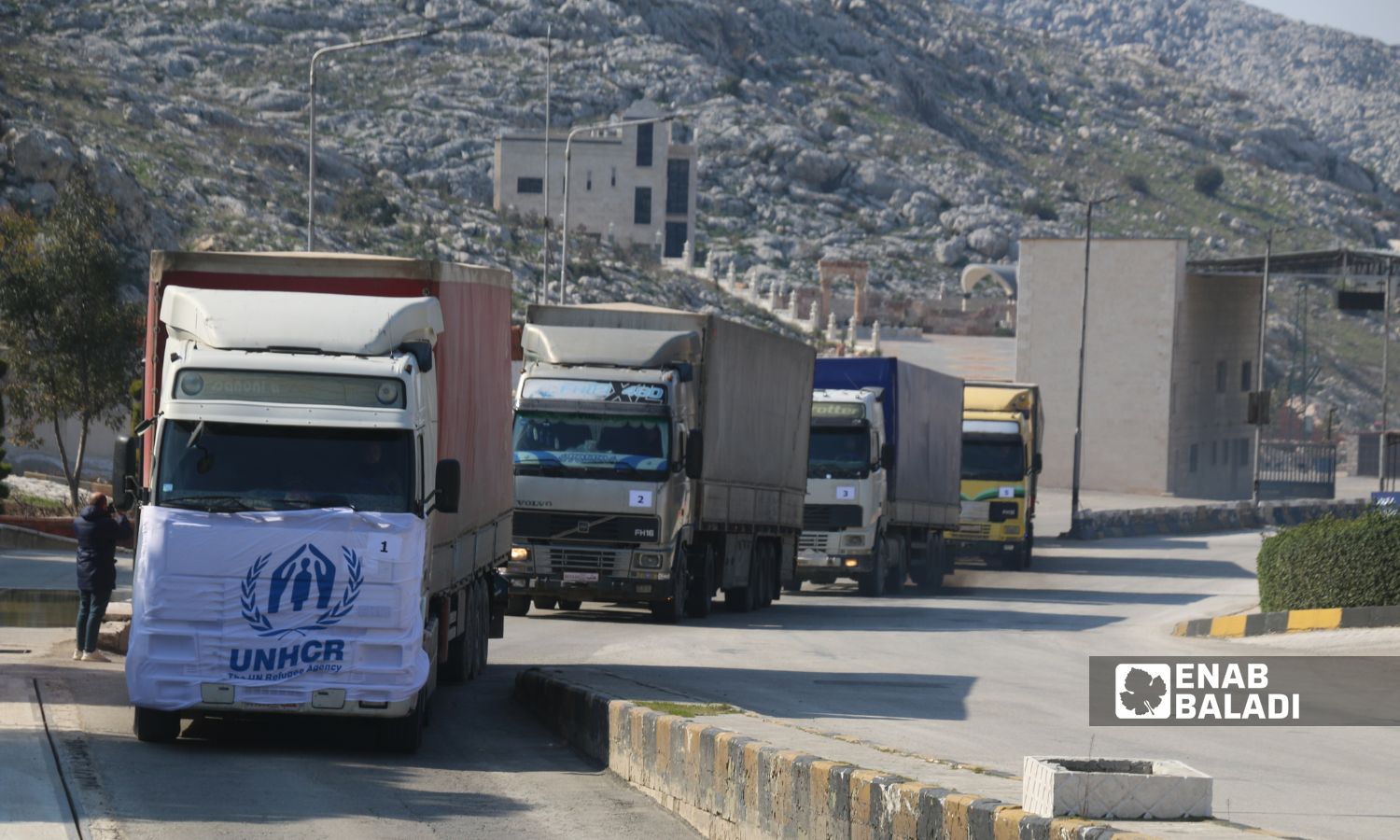
A UN aid convoy enters northern Syria through the Bab al-Hawa crossing – February 11, 2023 (Enab Baladi/Iyad Abdul Jawad)
Before the damage recorded by the Turkey-Syria earthquake, which has not yet entered the stage of statistics, the UN Office for Human Rights signed that the number of residents in Syria who need humanitarian assistance will rise to 15.3 million people in 2023.
In 2022, the number of people in need of humanitarian assistance reached 14.6 million, an increase of 1.2 million people compared to 2021.
In northwestern Syria alone, the number of people in need of humanitarian aid was about 4,600,000 people, including 3,300,000 people suffering from food insecurity and 2,900,000 internally displaced persons.
In light of these numbers, and what Syria suffers from the shortage and lack of basic services, most notably medical and relief, and with more than 90% of the Syrians below the poverty line, the earthquake came to double the suffering of the survivors of the rubble, some of them woke up on a bed in a hospital corridor crowded with the injured, thinking about their destination after treatment, since the earthquake took away their shelters, to say the least.
Countries or international organizations did not respond to the disaster in northwestern Syria, in front of the huge need, until four days after the earthquake.
The pre-scheduled convoy entered through the Bab al-Hawa border crossing, followed by UN and Turkish charitable convoys, whose assistance was limited to relief, medical, and food materials, where at the same time, several “friendly” countries of the Syrian regime provided various assistance by sending rescue and search teams to participate in rescuing those trapped under the rubble.
In the early days of the earthquake, the most important needs were for fuel due to the reliance on engineering equipment and bulldozers for the work of removing rubble and extracting the stranded.
In addition to the great need for medical equipment and consumables, which witnessed a large depletion due to the number of injuries, which exceeds the hospitals’ absorptive capacity.
The Idlib-based Ali Abdul Majeed, a researcher at the Omran Center for Strategic Studies, told Enab Baladi that the delay in UN aid to northwestern Syria has led to the loss of many lives and the disruption of basic services.
Abdul Majeed assured that the delay in fuel aid to the Civil Defense hindered the search and rescue mechanisms, such as moving vehicles between the affected cities, the financial inability to hire auxiliary vehicles, and the delay in rescue operations, which led to the loss of lives.
Some of the injured have also suffered deformities that will affect their lives in the future, as a result of the delay in the medical response due to the poor infrastructure of the medical sector in general, according to Abdul Majeed.
It also affected those harmed by the earthquake and increased their suffering in harsh weather conditions, including the lack of adequate shelters and tents, the absence of heating materials, the lack of clean drinking water, and adequate meals.
The senior researcher at the Omran Center for Strategic Studies, Dr. Sinan Hatahet, told Enab Baladi that the response to the disaster in the early days of the earthquake (the rubble removal phase) in northwestern Syria was fairly good due to the ability of the rescue Civil Defense agency and the local authorities to provide diesel.
While the needs during the current stage are mainly the establishment of shelters for the displaced, in addition to securing sleeping facilities such as tents, heating, medicine, and psychological support, adds Hatahet, who conducts daily tours to various sectors in northern Syria.
Hatahet, who is also a research associate in the project “Wartime and Post-Conflict in Syria” at the European University Institute, pointed to a remarkable activity in the response of organizations operating in the region, through the donations they receive and through the work of the local civil society to collect donations for those affected by the earthquake, stressing that despite this, it lacks a lot of financial resources to operate and cover all those in need.
In this case, the international community and the United Nations must intervene to cover these direct needs in large quantities by distributing available financial resources on the one hand and distributing essential goods whose prices may increase in the markets due to the great need for them.
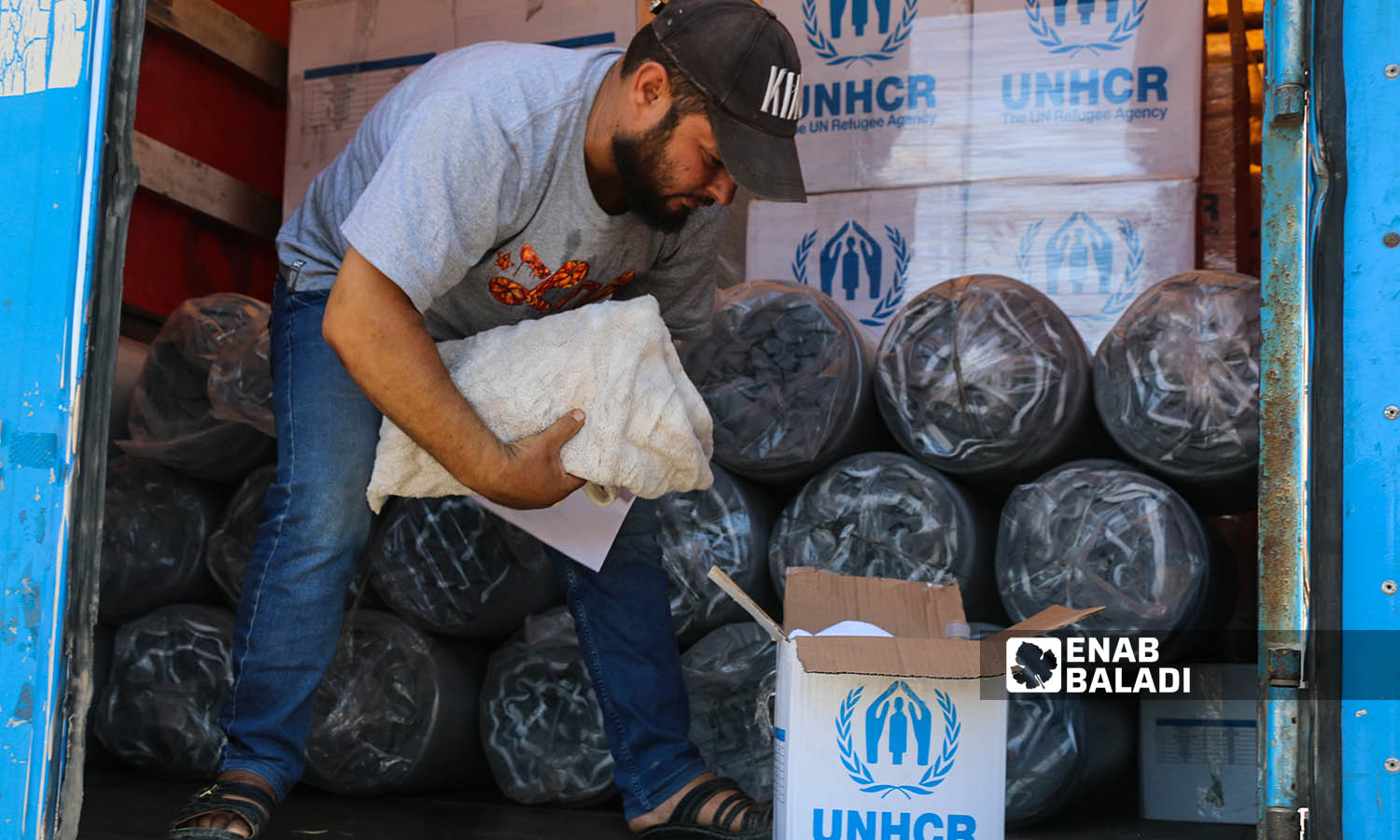
Local workers check a UN aid convoy after entering into northern Syria through the Bab al-Hawa border crossing with Turkey – July 28, 2022 (Enab Baladi/Iyad Abdul Jawad)
Munther al-Khalil, a doctor working on a research project to strengthen the health system in northern Syria, told Enab Baladi that in the early days, the health sector was responding tirelessly, but its already limited resources, such as diesel and medical supplies, are still decreasing in conjunction with the increase in needs, which made it lose its reserves.
The former Idlib health director added that if the golden period for rescue was three days, then the golden duration for the health response extends to about 15 days, stressing that it is important for the health sector in northwestern Syria to receive support over the next few days.
At this stage, the earthquake victims need monitoring and follow-up on the one hand, and during the first days of the response, many of the wounded were placed on surgical operations lists for the coming days due to the inability to deal with the large numbers.
According to al-Khalil, the needs of the medical sector during the first two weeks of the earthquake disaster are as follows:
1- Fuel to operate hospitals, oxygen generators, and ambulances around the clock.
2- Vital medicines such as anesthesia, antibiotics, and pain relievers.
3- Surgical supplies, laboratory materials, and dialysis treatments.
4- Orthotic supplies, including external fixators, plates, screws, and Kirchner wires.
5- Continued response to outbreaks of cholera and other infectious diseases, as the numbers could increase dramatically in such circumstances.
6- Psychological first aid for medical staff and patients.
The doctor says that the support of the local leadership of the health directorates and the Civil Defense agency is crucial in meeting urgent health needs amidst the need to take action to provide financial support to purchase the required materials and supplies from within Syria; there is an abundance in the local market to meet the immediate needs of the response efforts.
The needs of the near next phase are the needs to restart life by finding long-term housing solutions and sheltering those affected by the earthquake, such as prefabricated houses, according to researcher Sinan Hatahet.
Stressing the need to re-plan the education and health process and to compensate those affected, most of whom lost their money and property so that they can start their lives again.
In turn, Doctor Munther al-Khalil says that in the context of the post-acute response needs, the medical sector needs continuous support to meet its most critical needs, including ambulances, additional intensive care units, restoration of damaged hospitals, and consumables for orthopedics and neurosurgery.
if you think the article contain wrong information or you have additional details Send Correction